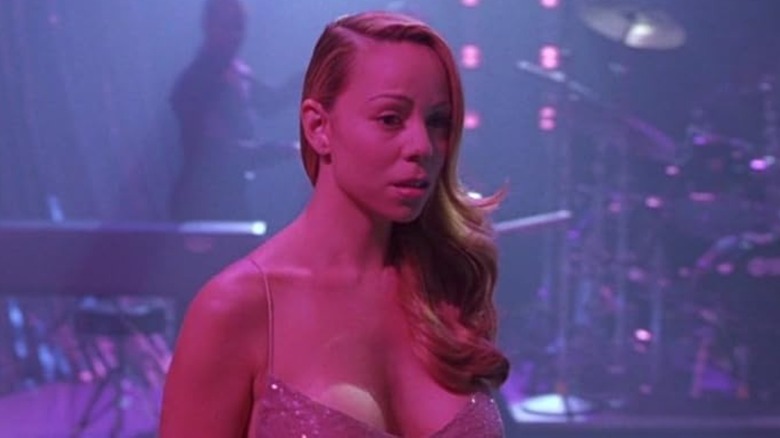Vondie Curtis-Hall’s 2001 musical stinker “Glitter” is pretty notorious, often held up as one of the worst movies of its decade. The film starred superstar singer Mariah Carey, and was the result of years of development. The project got its start back in 1997, when Carey brainstormed the idea for a period musical/concept album called “All That Glitters.” Sadly, various contractual obligations with Columbia Records prevented her from properly working on the album, and she ended up using some of the songs on another album, “Rainbows.” When she moved to a new label, Carey could finally give the project the attention it deserved.
Carey came up with a simple story — a club dancer becomes a star singer — and hired screenwriter Kate Lanier to expand it into a screenplay. The film was to be set in 1983, and was intended to be a penetrating character drama about a young woman’s struggles to reconcile her feelings about her mother, who abandoned her. The character, named Billie, would use her music as a means to wrestle with her maternal abandonment.
On paper, everything seemed to be clicking into place. Carey was (and still is) one of the best-selling musical artists of all time, so a move to feature films seemed natural, especially if it was to come packaged with a new Mariah Carey album. Carey re-titled the album/movie as “Glitter,” and set a release date for the autumn of 2001. This was a very personal passion project for the artist, and she was very protective of it. Once the film/album were out, she would finally be able to relax.
However, everything fell apart when audiences finally saw “Glitter.” The film was assertively awful. It was savaged by critics, nominated for six Razzies, and horrendously bombed at the box office.
What happened with Glitter?
Conceptually, everything should have worked, right? As it turns out, the film was plagued by production problems. Notably, no one liked the script, and it was being constantly re-written all throughout the shoot. Sometimes dialogue scenes were dropped altogether, and replaced with lugubrious improv. “Glitter,” as a result, feels incoherent from scene to scene. One can easily follow the story, of course, but each individual moment feels loose and chaotic.
It didn’t help that Carey’s promotional tour was equally chaotic. Some may remember Carey’s 2001 appearance on “Total Request Live” wherein she bafflingly handed out ice cream, talked disjointedly about the nature of psychotherapy, and stripped out of her ice cream man outfit to reveal a tank top and golden shorts. Host Caron Daly was flummoxed by her appearance. This was followed by several other bizarre live appearances wherein Carey seemed nervous and anxious. She was eventually hospitalized for “exhaustion,” and emerged with a diagnosis of bipolar disorder. This was all mere weeks before “Glitter” was set to be released. The movie and the album were both pushed back until September 21, 2001.
In a fit of horrendous timing, though, “Glitter” came out only 10 days after the 9/11 terrorist attacks, and the world was quite distracted. No one was in the mood for a featherweight musical about Mariah Carey’s struggles. On a budget of $22 million, “Glitter” only made about $2.4 million its opening weekend. The film closed about a month later, having made only $5.3 million overall. It remains the lowest-grossing project in Carey’s career. And even the “Glitter” tie-in album didn’t do well.
Everyone hated Glitter
“Glitter” was seen as a puff piece by an already-rich celebrity who seemed to be having problems unrelated to the contents of her record. Add 9/11 to the mix, and it wasn’t a pretty picture.
Critics were rather unkind to “Glitter.” As noted in this article’s headline, the film only racked up a 6% approval rating on Rotten Tomatoes based on 86 reviews. Christy Lemire, writing for the Associated Press, noted that Carey was no actress and should stick to singing. Megan Rosenfield from the Washington Post commented that “Glitter” wasn’t so much a showcase for Carey’s musical talents as it was an excuse for her to show off her body and look gorgeous on camera. Roger Ebert gave it a negative review, but he was slightly more fair, giving the film two stars. He noted that “Glitter” is weirdly dour and that Billie, Carey’s character, was having a miserable time throughout the flick. Robert Koehler of Variety said that it should be called “A Star is Dull.” (Come on, Koehler, “A Star is Boring” was right there!)
“Glitter” immediately jumped to the bottom of everyone’s worst-of-the-year lists. Years later, some critics pointed out that the savaging of “Glitter” was part of an unfortunate misogynistic trend to tear down women — in a supermarket tabloid way — at the center of the pop firmament. Similar savagery was being committed against people like Britney Spears, Lindsay Lohan, and Paris Hilton.
“Glitter” is still not good. As mentioned, it’s chaotic, badly filmed, and its story is inane. Carey is fine, but hardly extraordinary in the acting department. She gets her revenge every Christmas when “All I Want For Christmas Is You” is played constantly, and she provided a voice in “The LEGO Batman Movie,” so everything turned out fine.











